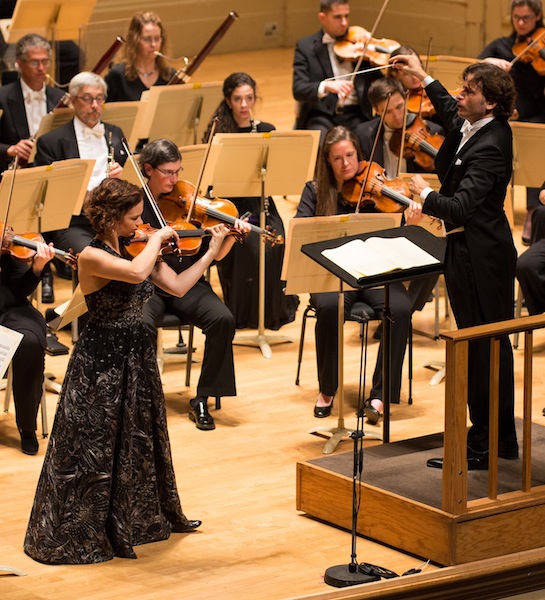Hahn provides the highlight in Gimeno’s BSO program

Hilary Hahn performed Dvořák’s Violin Concerto with conductor Gustavo Gimeno conducting the BSO Thursday night. Photo: Robert Torres
New seasons bring new faces to Symphony Hall, and the results are often rewarding.
Such was the case Thursday night, when Gustavo Gimeno made his subscription debut leading the Boston Symphony Orchestra in music by Ligeti, Dvořák, and Schumann.
The Spanish conductor’s star has risen quickly. Since his debut with the Concertgebouw Orchestra in 2014, Gimeno has landed the musical directorship of the Philharmonic Orchestra of Luxembourg, which recently extended his contract through 2022. This season will see him conduct the Dallas Symphony, Scottish Chamber Orchestra, and Vienna Symphony, among other ensembles. He has also conducted the BSO in concerts the past two summers in Tanglewood.
Gimeno has a commanding presence on the podium, and leads with an eye to the big picture of the music he conducts. Lyrical passages are a particular strength, and he is capable of crafting soft textures from scores that possess the occasional thorny orchestration.
In the opener, Ligeti’s folk-flavored Concert Românesc, Gimeno coaxed a shimmering, singing quality from the orchestra. There was a warm glow to the string and wind sound in the piece’s slow movements, and Gimeno drew out free flowing solos from the French horn, played radiantly by Richard Sebring. Tamara Smirnova’s violin solo had the intensity of a village fiddler.
In the quick movements, the music took off with appropriate rustic verve. Yet the lyrical line was ever present. Even the bristly dissonances of the final movement resonated with a vocal quality as Gimeno built the phrases to passages of whirling intensity.
In Schumann’s Symphony No. 1 in B-flat, which came after intermission, the conductor found a similarly song-like flow. The work, subtitled “Spring” due to its poetic reflection of the season, is a work of romantic reverie. The second movement brims with the arching lines one finds in Schumann’s lieder, and here Gimeno was at his best. Melodies and countermelodies wove together into soft tapestries of sound, and tempos were smooth and flexible.
Some conductors draw out the opening statements of the Scherzo for dance-like effect, but Gimeno adhered to the marked Molto Vivace tempo and the music glided smoothly. But sometimes Gimeno’s big-picture approach glossed over other details in the score. The outer movements could have used more rhythmic snap, particularly in the nimble string passages.
The solo spotlight of the evening fell upon violinist Hilary Hahn, who delivered a searching and dynamic performance of Dvořák’s Violin Concerto.
The work doesn’t have the built-in barnstorming power of the Tchaikovsky concerto, heard in Symphony Hall just last week in a performance by Gil Shaham. But in Hahn’s hands Dvořák’s work took on an edge-of-the-seat excitement.
Her tone was colorful, and she deftly maneuvered between phrases of bright radiance and amber-laced darkness to capture Dvořák’s frequent shifts of mood. And her technical passages had momentum and lyrical shape.
As in the Schumann, the accompaniment could have benefitted from greater rhythmic precision. The fanfare-like opening of the concerto lacked weight, and the syncopations of the finale didn’t quite match the energy of Hahn’s effervescent take on the theme.
Here too the slow passages fared best. In the second movement, Hahn unfolded lines that glowed with hymn-like solemnity, and Gimeno wrapped her in a soft bed of orchestral sound.
For an encore, Hahn offered a rendition of the Gigue from Bach’s Partita No. 3 that was both lilting and singing.
The program will be repeated 1:30 p.m. Friday and 8 p.m. Saturday at Symphony Hall.bso.org; 888-266-1200
Posted in Performances


